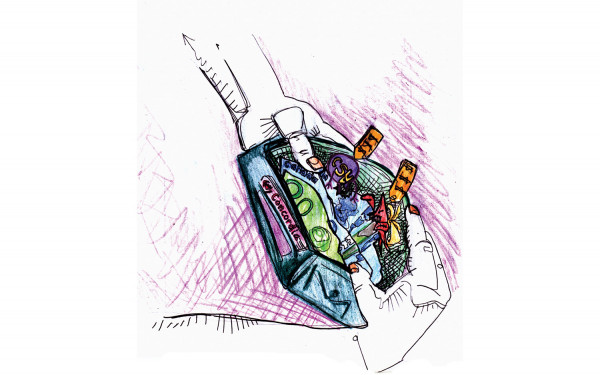Welcome to Concordia, Would You Like a Receipt?
Deregulating International Tuition Stirs Student Ire
If international student tuition becomes any higher at Concordia, Mayla Tenorio Vazquez says she may not be able to finish her degree.
The president of the Engineering and Computer Science Association is one of the nearly 7,000 foreigners paying $8,000 to $15,000 more than Quebec students for their education every year.
“Right now, with the current costs I’m paying, at the end of every year I sit down with my parents and ask ‘can I do this again?’” she said.
Tenorio Vazquez is in her third year and pays $19,000 a year to Concordia—which is $2,000 to $4,000 more than other international students pay—because she is studying in a deregulated discipline.
International students in engineering, computer science and at the John Molson School of Business are the only students whose fees are entirely controlled by Concordia. As of 2014, the Quebec government is no longer collecting international tuition for several disciplines, which gives Concordia the right to increase or decrease tuition however it chooses.
If tuition becomes more expensive, Tenorio Vazquez said she’ll probably go to a community college in the U.S. where her parents live.
“There’s a higher price on failing,” she said. “Sometimes I get advised by friends, ‘Oh if you’re doing bad in a class just drop it this semester and take it next semester.’ That’s $2,000, for me to drop a class.”
Engineering and computer science students also need to meet a minimum C- grade for prerequisites. Tenorio Vazquez says this puts pressure on students who don’t meet the grade and have to retake and repay for the class.
“That’s like a different game than for a student paying the Quebec rate.”
The Concordia Student Union, which represents all undergraduate students, has been against increased tuition fees since they were first announced in 2007. CSU council voted at a meeting on Jan. 13 to oppose any changes in tuition fees for international students that make education “less accessible.”
According to Concordia, those changes haven’t happened yet.

“I’m not interested in that. We’re trying to make sure education is affordable. It’s not easy, but that’s our ambition,” said Concordia president Alan Shepard.
That hasn’t always been the case. Around the time that Quebec announced plans to unfreeze tuition fees and deregulate certain programs in 2007, Concordia’s former president Claude Lajeunesse called for a complete deregulation of all tuition, including that of Quebec students.
Amanda Holt, the International Student Affairs coordinator at JMSB, says she isn’t afraid higher costs will deter international students.
“American students are interested because it’s a great deal,” Holt said. “The cost for a whole degree here compares to one year in the States.”
Holt works on cultural and social programs such as JMSB Life, which is offered to all international undergraduates and graduate students throughout their degree.
For most international business students, the costs at Concordia are still less than what they would be paying at home institutions, according to Holt. Concordia’s fees, about $21,000, are also lower than McGill’s, which are set at about $40,000.
Deregulating in an economy of cuts
A report commissioned by the education ministry in 2014 recommended removing restrictions on all non-Quebec student tuition fees, but maintaining low costs for in-province students. The recommendations were criticized as opening the door for hikes to tuitions for Quebec and graduate students.
“It’s a concern to us,” said Alex Ocheoha, president of Concordia’s Graduate Students Association. “After the deregulation of undergraduate programs, the next step is graduate programs. That’s why we have to be against it from the start.”
In the face of growing budget cuts, deregulating programs is a viable option for universities to fund their operations and likely invest in underfunded departments. Since 2012, Concordia estimates a loss of $30 million per year in government grants. The university is expecting an $8 million deficit by the year’s end, after saying they cut as much as they possibly could.
In the past, the administration has tried to reduce their budget through measures such as a buyout program it carried out last year. Concordia hoped 180 employees would take an early retirement severance package, but only 90 people participated. Among those people who took the buyout, 40 of them will not be replaced.
Concordia also won’t be upgrading computers, and have increased seminar classes, while reducing the number of courses offered in arts and science, fine arts and John Molson School of Business.
Cuts to the university’s co-op program have reduced the opportunities for students to work in smaller and non-profit organizations. The provincial government cut a grant that allowed the university to subsidize salaries for students to work in places that can’t afford to pay interns. Students can now only apply for internships at larger companies that can afford to pay them. The art history department has cut its co-op program altogether.
Note: Tuition rates for 2011-2012 were based on Ministry requirements and estimations since there were not available online.
Source: Concordia University Academic Calendar, Concordia.ca, estimation
What is deregulation, anyway?
As of the 2007-2008 year, business, engineering, law, computer science, mathematics and pure sciences programs across Quebec are fully deregulated for international undergrads. This means a Quebec university can charge whatever they want and can keep the tuition fees. The deregulation process was in transition until 2014, when Quebec completely phased out all funding for international students in these programs.
Since the programs were completely deregulated in 2014, Concordia hasn’t made any drastic increases in tuition for international students, unlike McGill, where fees have risen beyond $30,000 a year. Concordia administrators are still figuring out if, and by how much, they would raise tuition.
In the past, fees from these programs were collected by the provincial government and redistributed to universities based on enrollment and the financial costs of certain programs.
Universities like Concordia and McGill, which attract nearly 17,000 international students, have referred to the redistribution system as “claw-backs” since most of the money collected goes toward funding regional universities or schools with fewer international students.
In 2007, the provincial government gave universities the choice to increase supplementary fees by 10 per cent for all international students, in order to fund promotional and recruitment activities. This lets Concordia charge more than $1,000 in extra fees that go back into the university’s coffers.
Concordia continues to charge this extra 10 per cent for non-deregulated programs.
Despite protests by students in 2008, the university’s board of governors voted in favour of hiking international fees in order to take advantage of this 10 per cent surcharge. Students managed to filibuster a meeting on June 19 until it lost quorum. Ultimately, their efforts could not prevent Concordia from instituting a hike.
The controversial decision eventually took place via teleconference on June 27. The CSU managed to win a 10-day injunction by the Quebec Superior Court, after they called the process illegal, but the surcharge came into effect soon after.
For student representatives, deregulating programs cuts into the fundamental idea of education as a human right.
“You’re creating a scenario where there are two different gas stations, one at Concordia and one at McGill,” said Terry Wilkings, General Coordinator at the CSU. “Concordia is looking at McGill, and McGill is looking at Concordia to see what’s the sweet spot to attract the highest number of students, but also get the highest amount of revenue from these students.”
The CSU has been critical about the provincial cuts to education and other social services spending, which it claims is privatizing provincial institutions.
“Increasingly you’re seeing a shift towards: how can we market the product of Concordia’s education to an international student market?” Wilkings said. “I don’t think that’s how we should be viewing international students.”
International students on the market
Concordia is currently testing pricing models that will give international students and parents peace of mind that tuition won’t jump halfway through their degree.
“We are working on an approach where students will have a tuition guarantee for the duration of their studies in the deregulated program,” said Concordia’s spokesperson, Chris Mota, in an email. “This is an important factor in choosing a university by both students and parents.”
This pricing model could come with restrictions that could penalize international students who change programs or who participate in campus life and take longer to complete their degree, Wilkings from the CSU said.
The university says it will have to set some rules for this model “in order to protect both the student and the university.”
“Obviously the university is interested in creating some level of certainty,” Wilkings said. “The best way to create certainty is to create a flat fee.”
But Quebec has been working with a double-standard funding model since the ‘90s. Students from outside of the province have been paying more in order to compensate for growing costs and tuition freezes for Quebec residents.
“We see this as playing an optics game—trying to minimize anger felt by in-province students and their families, and, you know, voters, by slightly reducing in-province fees at the expense of charging out-of-province students significantly more,” said Erika Shaker from the Canadian Centre for Policy Alternatives, a national research group.
Shaker is the director of the organization’s Education Project and the co-author of a report called, “What’s the Difference?” which studies university tuition policies.
Quebec has maintained the second lowest fees in Canada and has put in place policies to increase non-Quebec resident fees by approximately six per cent per year over the last three years, in order to bring those rates closer to the Canadian average.
“I think it’s far more accurate to say ‘bring accessibility standards down to the Canadian average’—because high tuition fees is not something for any province to aspire to,” Shaker said. “Universality and accessibility, however, are—and sadly the move towards charging students more and expecting less from public funding undercuts any commitment to these principles.”
Mayla Tenorio Vazquez, says she hasn’t heard of any plans to increase the rate in her discipline. She said the engineering faculty is concerned about how students are being affected.
“A lot of what attracts students to Concordia is the low tuition rates compared to the rest of Canada,” she said. That same low tuition is part of the reason she came to Montreal in the first place.
How much funding comes from the government?
45% in Ontario // 80% in Newfoundland and Labrador // 70% in Quebec
Source: Canadian Centre for Policy Alternatives
How are tuition fees calculated in Quebec?
Base fee:
This is what Quebec residents pay. Base tuition with a full 30-credit course load has increased from $1,668 in 2005 to $2,293 in 2015.
Out-of-province forfaitaire:
For Canadians that aren’t Quebec residents, tuition is made up of the base fee and a “forfaitaire” or premium.
The forfaitaire for out-of-province students has increased on average by 8 per cent for the last three years as part of Quebec’s plan to “catch up” to other provinces’ tuition fees in Canada. The Quebec government collects and redistributes this forfaitaire.
The out-of-province forfaitaire with a full 30-credit course load has increased from $2,733 in 2005 to $4,737 in 2015.
International forfaitaire:
Foreign students pay a “forfaitaire” that is greater than Canadian students and varies depending on the program.
Students in pure sciences, engineering, computer science, math, architecture, agriculture, forestry, fine arts, cinema, photography, music or medicine pay a higher forfaitaire. Students studying administration, law, social sciences, geography, education, phys. ed., literature or humanities pay a somewhat lower rate. The Quebec government collects and redistributes this forfaitaire.
The international forfaitaire with a full 30-credit course load has increased from $8,100–$9,210 in 2005 to $12,194–$13,864 in 2015.
Additional supplements:
As of 2008, Concordia can charge extra for all international students. The additional fees are calculate as a percentage of the international forfaitaire, with a max surcharge of 10 per cent.
E.g. if the international forfaitaire is $400 per credit, Concordia can charge an additional $40 per credit, which adds up to $1,200 in extra fees for a full-time student. Concordia keeps this supplement.
Compulsory fees:
These fees are set by the university and in 2015 added up to $900 for a 30-credit course load. The Quebec government capped the amount of increases universities can make to these fees. Concordia keeps these funds, which are allocated for administrative, technology infrastructure and recreation and athletics costs.
To sum it up:
Quebec students: Base fee ($2,293) + compulsory fees ($900)
Out-of-province students: Base fee ($2,293) + government forfaitaire ($4,737) + compulsory fees ($900)
International students: Base fee ($2,293) + government forfaitaire ($12,194–$13,864) + Concordia premiums ($1,219–$1,386) + compulsory fees ($900)
International students in deregulated program: $xx,xxx (at the university’s discretion)
Note: Excludes student association fees which are an estimated $300–$465 extra for a 30-credit course load, depending on the faculty.
Source: Concordia.ca, Ministère de l’Éducation, de l’Enseignement supérieur et de la Recherche

.png)





